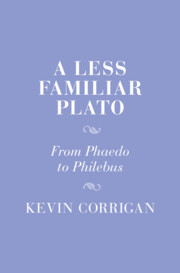Book contents
- A Less Familiar Plato
- Cambridge Studies in Religion and Platonism
- A Less Familiar Plato
- Copyright page
- Contents
- Acknowledgments
- Abbreviations
- Introduction
- Part I Embodiment and Participation in the Divine
- 1 The Phaedo
- 2 The Place and Scope of Participation in the Divine in the Thought of Plato and Aristotle
- Part II Introduction to the Republic and Philebus
- Part III Introduction to Love, Myth, Erotikē Technē, and Generative Epistēmē
- Appendix Scientific Perception or Sharp Seeing in the Middle and Late Dialogues
- Primary Texts
- General Bibliography
- Index
1 - The Phaedo
Embodiment, Disembodiment, and the Question of “Self”
from Part I - Embodiment and Participation in the Divine
Published online by Cambridge University Press: 26 October 2023
- A Less Familiar Plato
- Cambridge Studies in Religion and Platonism
- A Less Familiar Plato
- Copyright page
- Contents
- Acknowledgments
- Abbreviations
- Introduction
- Part I Embodiment and Participation in the Divine
- 1 The Phaedo
- 2 The Place and Scope of Participation in the Divine in the Thought of Plato and Aristotle
- Part II Introduction to the Republic and Philebus
- Part III Introduction to Love, Myth, Erotikē Technē, and Generative Epistēmē
- Appendix Scientific Perception or Sharp Seeing in the Middle and Late Dialogues
- Primary Texts
- General Bibliography
- Index
Summary
The Phaedo has long been read as a paean to the disembodied soul. In the view of many scholars, the dialogue portrays “an unhappy partnership between body and soul” that only looks forward to the separation of soul from body in death;1 it even provides “a dangerously negative point of view in which no allowance is made for the development of the human emotions.” In the words of one prominent reader, “there is good reason to regard the teaching of the Phaedo, splendid though it be, as pure intellectualism divorced from life, its final aim being the eternal preservation of the soul in the cold storage of eternally frozen absolute Forms.”2 While it is true that Socrates argues powerfully for the separation of soul from body, and of intellect from feeling, in the early part of the dialogue, this is only one important feature of a broader question. Indeed, Socrates does not so much eliminate feeling from soul as elevate ordered feeling into the soul as real agent. Separation as philosophical practice, then, is one crucial part of a bigger picture. I will argue here that in the second half of the Phaedo, we find at least three models of positive embodiment: in the final argument, in the myth (which is by no means a redundant appendix but an articulation of the possible consequences of the dialogue’s major hypotheses), and, finally, in the death scene of Socrates, sections that pick up important motifs already present in the earlier sections. These models open up the question of self and agency, especially as represented in the figure of Socrates himself. The Phaedo, then, is very much about this life and about how to live well in this world; it provides a meditation on the soul not as belonging to some cold storage unit of frozen forms but rather as the life-giver capable of waking up the slumbering self to a different axis of being even in embodied existence.
- Type
- Chapter
- Information
- A Less Familiar PlatoFrom Phaedo to Philebus, pp. 11 - 48Publisher: Cambridge University PressPrint publication year: 2023

